Lawyers Of Two Executed Iranians Say The Hangings Were ‘Unjust’
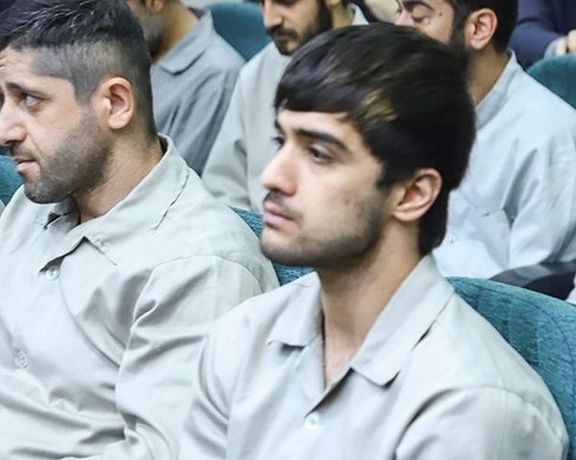
Lawyers of two young protesters hanged Saturday in Iran say the judiciary executed them so hastily that there was no chance for legal follow-up on their cases.

Lawyers of two young protesters hanged Saturday in Iran say the judiciary executed them so hastily that there was no chance for legal follow-up on their cases.
Ali Sharifzadeh Ardakani, Mohammad Hosseini's lawyer, published a photo of a request for retrial, saying the execution of his client was "unjust".
“Considering the call for appeal and submission of documents, including harassment of my client to extract a confession and documents regarding his mental illness, carrying out the sentence was unjust,” he added in a tweet.
Sharifzadeh said that a day after the verdict’s confirmation, he filed a request for retrial, but officials turned down his request.
Mohammad Aghasi, the lawyer of Mohammad-Mehdi Karami, also said in an interview that “They executed my client so quickly that they didn't even give him a chance to write a petition for retrial.”
Both lawyers were not allowed to defend their clients in court, as Iran’s judiciary only recognizes those attorneys that it selects and appoints to political cases.
Aghasi pointed out that the Supreme Court also failed, because the sentences should have been overturned when the defendants did not have a lawyer of their choice.
Based on the statements of the defendants and their lawyers these two protesters were tortured physically and mentally to extract confessions, a common practice by Islamic Republic officials.
Despite public anger over the executions, the judiciary continues to issue death sentences and exerts pressure on hundreds of imprisoned protesters and their families.
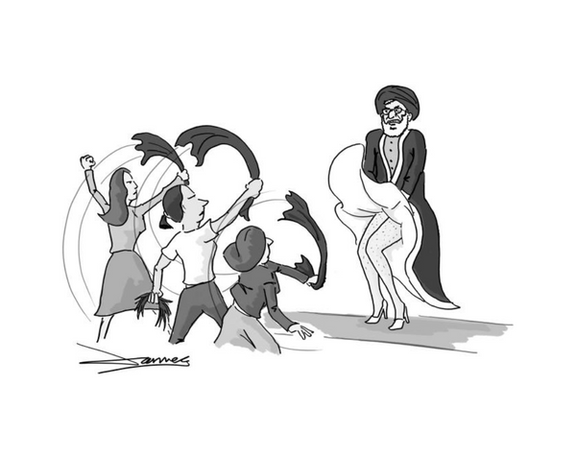
Hard-line student unions have called on Iran's foreign minister to expel the France's ambassador over “insulting cartoons” by French satirical magazine Charlie Hebdo.
In a letter published by ISNA in Tehran on Sunday, the student unions called on the foreign ministry to take “the most serious action against the new insult supported by the Elysée against the people of Iran and Muslims of other countries.”
“Considering the history of Charlie Hebdo in insulting the sanctities of about 2 billion Muslims around the world, we expect the foreign ministry not to accept any excuses by the French government,” reads the letter.
The Iranian foreign ministry on Wednesday summoned France's envoy to Tehran to protest "insulting" cartoons depicting Supreme Leader Ayatollah Ali Khamenei published by Charlie Hebdo.
The magazine said the series was part of a competition it launched to support anti-regime demonstrations in Iran. France has said media in free and the government cannot interfere with what they publish.
Foreign ministry spokesman Nasser Kanaani said the publication of the cartoons was an "insult to authority, sanctities, and religious and national values" of Iran and the Islamic Republic does not accept these insults.
Charlie Hebdo has been the target of three terrorist attacks: in 2011, 2015, and 2020. All of them were presumed to be in response to several cartoons that it published controversially depicting Islam’s Prophet Muhammad. In the 2015 attack, 12 people were killed.
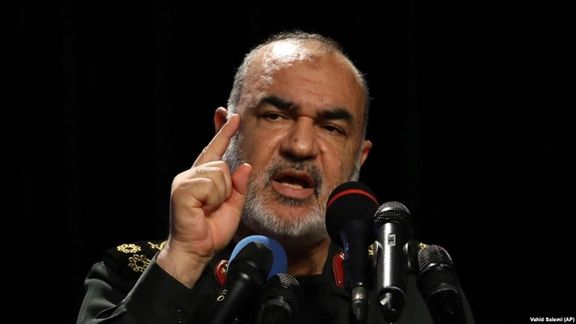
Iran’s hardliner commander of Revolutionary Guard has once again threatened the West to take revenge for the killing of former IRGC General Qassem Soleimani.
Major General Hossein Salami said Sunday during an event to commemorate Soleimani’s death that “sooner or later we will avenge his assassination.”
He claimed that no one can create problems for the Islamic Republic establishment, and addressing the West he said, “stop your miscalculations.”
Soleimani was in charge of supporting and organizing militant proxy forces, including the Lebanese Hezbollah and Iraq Shiite militia groups that were repeatedly attacking US forces in Iraq and eslewhere.
On Saturday, Iran’s Revolutionary Guard said retaliatory military attacks against US targets for the killing of Qassem Soleimani in 2020 are still viable options.
IRGC spokesman Ramazan Sharif was quoted by Iranian media as saying that “moves such as [the attack on] Ain al-Assad base [in Iraq] are still being considered and “will become operational in due time.”
Five days after Soleimani was killed by a US air strike on January 3, 2020, Iran fired ballistic missiles at the Iraqi base hosting US troops. No Americans were killed but reports at the time spoke of dozens of servicemen receiving concussion because of the strong explosions.
At the time, President Donald trump who ordered the killing said that Soleimani presented an imminent danger to US personnel and interests in the region.
Since then, the Islamic Republic has continued threatening revenge for Soleimani, and these threats were repeated during the third anniversary of his killing this week.
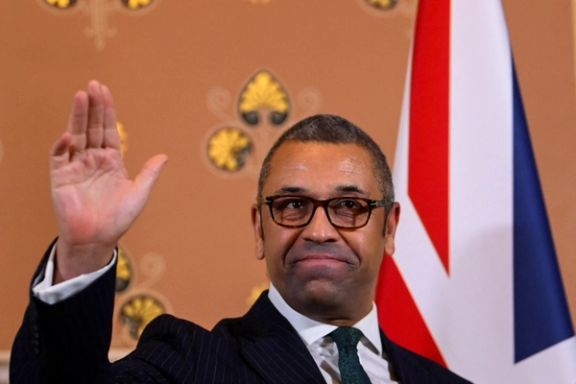
The United Kingdom has slammed Iran's execution of two protesters Saturday and urged the regime to "immediately end the violence against its own people".
The country’s Foreign Minister James Cleverly in a tweet said, "The execution of Mohammad Mahdi Karami and Seyed Mohammad Hosseini by the Iranian regime is abhorrent."
"The UK is strongly opposed to the death penalty in all circumstances," he added.
Iran hanged the two men for allegedly killing a member of the security forces during nationwide protests that were triggered following the death of 22-year-old Kurdish woman Mahsa Amini in police custody in September.
The convictions were not based on a criminal charge related to the murder per se, but they were charged with ‘moharebeh’, meaning “war against God”, a vague religious concept. The Islamic Republic applies the charge to people who might get into a confrontation with security forces during protests.
Despite widespread international attempts to stop the executions, the regime decided to implement the verdict reached in November. Officials say death sentences for three others in the same case have been canceled.
So far, the government has executed four protesters and nearly a dozen others have received the death penalty, some for much less charges than murder, while at least 100 protesters face charges that could end in death sentences for them, an Iranian human rights group based in Oslo has reported.
Dozens of prisoners are either on hunger strike or suffer from life-threatening illnesses that are not treated by prison authorities and some are deprived of life-saving medications.
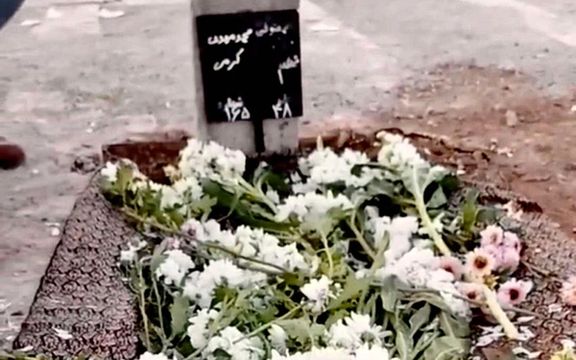
A host of Western officials have condemned the executions of two protesters in Iran Saturday while French senators urged strong measures against the regime.
The European Union in a statement Saturday condemned the execution of Mohammad Mehdi Karami and Seyyed Mohammad Hosseini in Iran and called the executions “yet another sign of the Iranian authorities’ violent repression of civilian demonstrations” and urged Iranian government to “strictly abide by their obligations enshrined in the International Covenant on Civil and Political Rights” to which Iran is a party.
“The European Union calls once again on the Iranian authorities to immediately end the strongly condemnable practice of imposing and carrying out death sentences against protesters,” the EU said and called on Tehran to “annul without delay the recent death penalty sentences that were already pronounced in the context of the ongoing protests and to provide due process to all detainees.”
Condemning the executions and calling them “abhorrent”, British foreign minister James Cleverly urged the Islamic Republic to "immediately end the violence against its own people". "The UK is strongly opposed to the death penalty in all circumstances," Cleverly said.
US Special Envoy for Iran Rob Malley tweeted, “Appalled by the regime’s execution of two more young Iranians after sham trials. These executions must stop. We and others across the globe will continue to hold Iran’s leadership accountable.”
French senators have tabled a resolution calling on the EU for ending nuclear negotiations with Iran and designating the Revolutionary Guards (IRGC) as a terrorist organization.
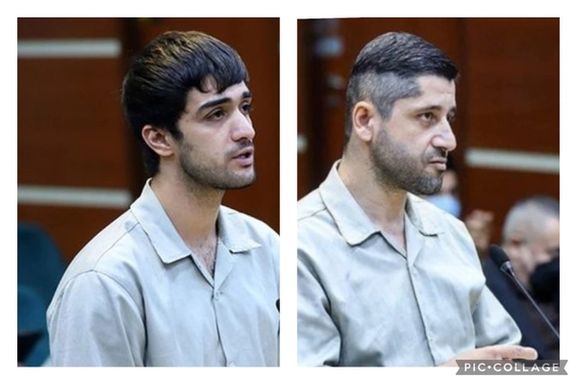
“Over 40 senators have supported the motion that requires the European Union to end the talks to restore the 2015 nuclear deal (JCPOA), list the IRGC as a terrorist organization, and shut down Iranian banks in the EU countries and close its airspace to Iranian flights for fundamental human rights violations,” Senator Nathalie Goulet who proposed the motion with her colleagues in the upper house of the French Parliament told Iran International.
The European affairs committee of the Senate will be working on this resolution over the next ten days, she added.
The resolution calls on the Government and the European Union to “consolidate and extend the limitation of access to the primary and secondary capital markets of the Union for Iranian banks, including those established on the territory of the European Union.”
It also calls on the European Union to expel students in the EU who have a family link with Iranian officials on the list of Persons Subject to Restrictive Measures for Serious Human Rights Violations in Iran.
Other European lawmakers, some of whom have accepted the political sponsorship of some of several detained Iranian protesters including those with a death penalty hanging over their heads strongly condemned Saturday’s hangings of, Karami and Hosseini, urging their governments to adopt restrictive measures against Iran for its violation of human rights.
Helge Limburg, the German lawmaker who accepted Karami’s political sponsorship in a tweet said he could not express his deep “sadness and rage” over his execution while French lawmaker Clementine Autain who also sponsored Karami in a tweet strongly criticized the French President Emanuel Macron for his “silence vis-à-vis the [Islamic Republic] regime.”
Norbert Röttgen, member of the German Parliament (Bundestag) in a tweet after the executions said Germany and the EU must “finally start taking decisive action to protect the 19k other prisoners” while another German MP, Hannah Neumann, in a tweet said the regime “will not stop with more talks and red carpets”. “We need to send a clear signal and treat them as what they are: terrorists,” she added.
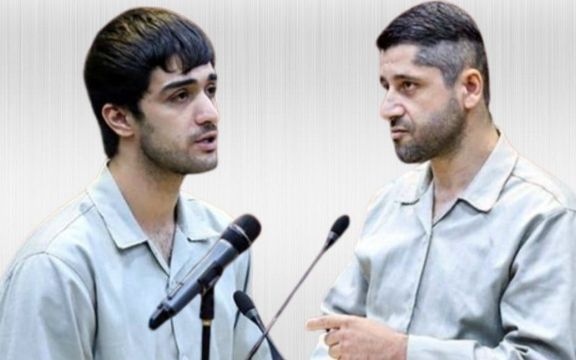
Iranian rights defenders say that if the world does not put more pressure on Iran's regime, it will kill more protesters after two young men were hanged Saturday.
The Oslo-based Iran Human Rights Organization called the execution of Mohammad Mehdi Karami, 22, and Mohammad Hosseini, 39 was a "criminal act" and warned of "massive executions of protesters" if there is no "adequate response from the international community".
Both men were arrested for the killing of a Basij militiaman named Ruhollah Ajamian during the protests on November 3 in Karaj west of Tehran.
Canada-based activist Hamed Esmaeilion said in a tweet Saturday that “terrorists of the Islamic Republic murdered two innocent young men without access to the lawyers and behind closed doors. The time has come to expel their ambassadors.”
British-Iranian actress and human rights activist Nazanin Boniadi also condemned the executions saying, “Shame on the global community and leaders for not stopping the Islamic Republic’s atrocities.”
Masih Alinejad, another rights activist, also said in a tweet, "In our occupied land, our loved ones are being executed for chanting for freedom, for protesting against poverty, corruption and brutality."
Two protestors named Mohsen Shekari and Majidreza Rahnavard were executed in Tehran and Mashhad in December.
Following mass arrests of protestors in the last four months and hasty death sentences issued for 11 people in sham trials, human rights activists and some foreign officials have been calling for weeks to hold the Islamic Republic accountable.